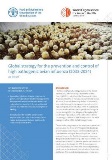Empowering veterinary professionals globally to combat highly pathogenic avian influenza

The FAO Virtual Learning Centers (VLCs) have launched an online course to tackle highly pathogenic avian influenza (HPAI) challenges by offering a comprehensive learning experience on avian influenza vaccine stewardship.
The training course, Vaccine Stewardship in Prevention and Control of highly pathogenic avian influenza, aims to equip veterinary services staff with the skills required to design, implement, monitor, and reassess avian influenza vaccines and vaccination programmes. It furnishes practical tools needed to support governmental veterinary services in vaccination decision-making and implementing vaccination programs effectively in the field.
HPAI is a severe and highly contagious disease that has severe impacts on animal and human health, livelihoods, and the economy. The disease has also spilled over to several mammalian species, and may result in severe ecological and biodiversity consequences.
"This course comes at the right time when there is an alarming spread of HPAI in poultry, wild animals and other mammals. Vaccination is one of the tools, increasingly being considered to prevent HPAI at source. However, vaccination must be planned with well defined objectives, applying good quality, safe and well-matched vaccines. This course provides countries with the guidance to do so " says Madhur Dhingra, FAO Senior animal health officer.
In a span of four weeks, the course systematically covers avian influenza vaccine stewardship, addressing a variety of topics. These include selecting, procuring, and administering vaccines; identifying vaccine platforms; monitoring and surveillance of vaccinated flocks; vaccine failure; detecting and managing antigenic variant viruses; revising vaccination programs; and assessing the poultry value chain to mitigate HPAI risks.
"This innovative online course goes beyond theory, offering a deep dive into avian influenza vaccine stewardship. During the four weeks the training is open, participants have the opportunity to discuss and share experiences among themselves and with world’s leading subject matter experts " says Ms Maria DeLaPuenteArevalo, Virtual Learning Centers Coordinator.
This course will be adapted, translated, and delivered across multiple FAO regions. Around 300 participants can take the course at the same time and it's compatible across multiple platforms, such as smartphones, computers, and tablets, and it is accessible upon registration on the FAO VLCs platform.
- Website: FAO Virtual Learning Centers
- Website: OFFLU
- Publication: Global consultation on highly pathogenic avian influenza (HPAI). Rome, Italy, 2-4 May 2023

